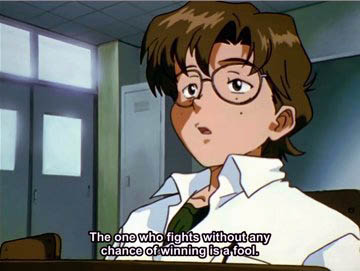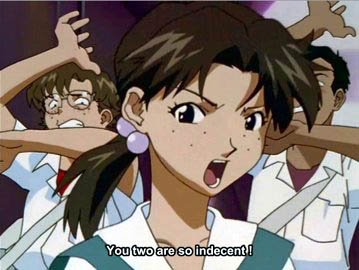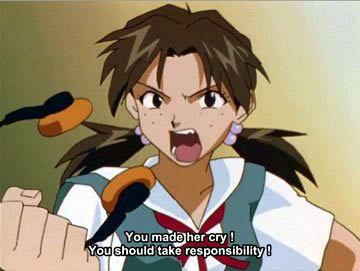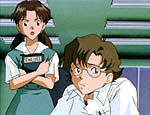FGC:Supplemental (Toji, Kensuke, and Hikari as Id, Ego, and Super-ego)
Episode #03: Toji, Kensuke, and Hikari as Id, Ego, and Super-ego
(Expanded Commentary from C-060)
Shin-seiki: I have a theory that this trio (Toji, Kensuke, and Hikari), to the extent that they “represent” anything beyond themselves, can be considered emblematic of the Freudian concept of Id, Ego, and Super-ego. Toji is defined by his emotions and appetites…
…so he represents the Id; Kensuke tends to think things through more sensibly and logically*…
…so he represents the Ego, and Hikari is pre-eminently concerned with what is morally right, thus she represents the Super-ego. We see her function as a sort of moral arbiter or conscience to the other children…
…and we see this aspect of her personality demonstrated right off the bat here:
Note how she doesn't just simply remind Kensuke to deliver the print-outs to Toji and leave it at that; she has to lay a whole guilt trip on him: “Aida-kun, you're on good terms with Suzuhara, aren't you? He's been absent for two weeks. Aren't you worried?” She sounds like my mom…
*I do say “tends”; Kensuke is occasionally carried away by fits of enthusiasm. On the other hand, in the scene referenced above as an example, I think the point is certainly being made that Kensuke is sensible and level-headed in comparison with Toji.
Reichu: Just for a little disclaimer of sorts: It should noted that, while this is fun stuff to speculate about, Freudian interpretations — especially with questions as precarious as "What in NGE represents id/ego/superego?" — have a habit of varying wildly from person to person. Almost anything is fair game, though, as with everything else, "some ideas are better than others".






